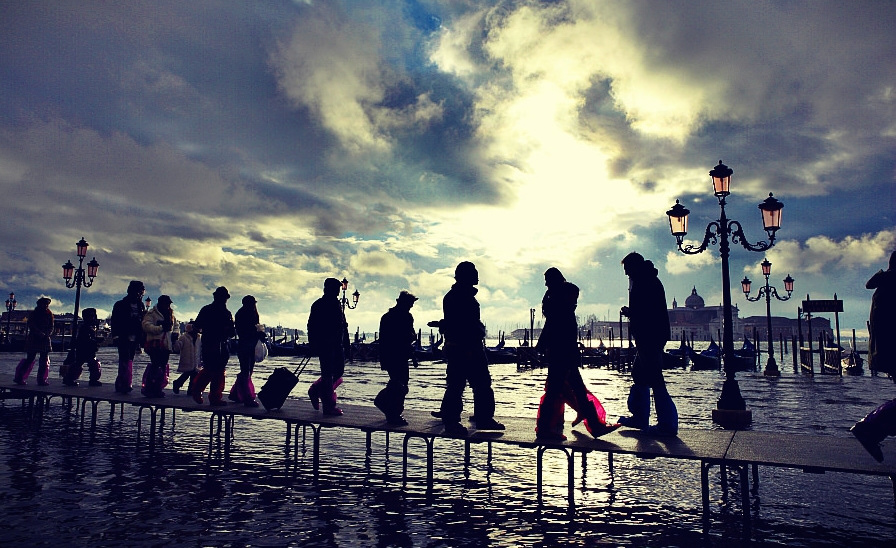Is travel the new opiate of the masses? That’s what Marx called religion. (Though sympathetically: religion was “the sigh of a distressed creature, the soul of a heartless world …”) But ultimately, an instrument of oppression.
So, at least in Europe, the masses have begun to rise against the masses: last month in Venice — where 55,000 locals are overwhelmed by 70,000 to 90,000 tourists daily. Those numbers make sense in Disney World, not anywhere real.
More recently in Barcelona, with Catalan gusto: “If it’s tourist season, why can’t we hunt them?” They’ve slashed tires on tour buses (or tyres, as the tabloid press has it: “Brit Holidaymakers face wave of attacks at hands of tourist-hating anarchists” — a perfect English nightmare notion of Spain.)
The middle-classification of China also underlies these events. About 40 million Chinese are expected to head for Venice in coming years. I saw busloads of Chinese tourists in Moscow and St. Petersburg last month.
Why do people join tours? What do they expect to find? Greater meaning to their lives, I think. Somehow it must be in that square, or cathedral. They aren’t there mainly for fun, it’s about edification, and the most meaning they find is often not at tour stops but with fellow travellers on that bus for weeks, or at meals. Couldn’t they do that at home? Yes, but there must be more, out there somewhere.
The pushback against “tourrorists” is a First World phenomenon. Tourism has always been a pernicious force in places like the Caribbean, where it seethes in petty micro-encounters. It poisons relations between locals and visitors, especially since the travel is hardly ever reciprocal. We don’t guide them around Ontario. Europeans though can recall economic alternatives to allowing travellers to slop through your streets and patronize you for the price of a tip.
The solution is clearly government controls: visas for tourists, limits on numbers. But that would mean less reliance on tourism economically, and the need to revitalize those economies.
Or you could think more radically. Is it possible that tourism has reached the end of its life cycle, like, possibly, zoos? Residents in big tourist cities react a lot like animals in cages: pacing, then snarling. There’s been a long effort to reform zoos but they still look pretty shabby. Why not eliminate them, like animals in circuses? You could still have tourists, like foreigners passing through game parks in Africa, but stringently vetted. And the mobs? Let them stay on their cruise ships, and get to know each other.
#NoConfederate. There’s a campaign to block the next projected series by the guys who made Game of Thrones, David Benioff and D.B. Weiss (the DBs). It’s a counterfactual where the South wins the U.S. civil war and slavery persists.
In principle, I’m in favour of counterfactual fiction for political reasons. It reminds you that almost anything could’ve been different and puts the onus on everyone to fight for the best of potential futures.
In that light, the U.S. civil war has been well covered, though the DBs, who are American, seem to think they’re onto something unique. Personally, I’d be more intrigued by the American Revolution: the British win, so slavery gets abolished in America in 1833, along with the rest of the Empire, so there’s no Civil War or deep racial scars in the U.S. In other words, the bad guys actually won that one.
But everything depends on how the show is done. With GoT, they were anchored in a great text; it had few contemporary implications; and they brilliantly cast British and European actors in most parts.
But on Confederate, they seem to think they’re serving the “progressive” cause. HBO said, “If you can get it right, there’s a real opportunity to advance the race discussion.” Weiss said there “is a reason to talk about [slavery], not a reason to run from it. And this feels like a potentially valuable way.” Their African-American co-producer says, “I think there’s a duty to force this discussion.”
But Black Lives Matter has already forced the discussion, and “advanced” it. Before them many generations and individuals, Black and white, pre- and post-Civil War, did so. What’s needed now isn’t more jabber, or another series; it’s leadership, organization and progress. Their words bode poorly for their show.
So en principe, I’m in favour of their right to go ahead, but I’m kind of hoping they won’t.
This column was first published in the Toronto Star.
Photo: Roberto Trombetta/flickr
Chip in to keep stories like these coming.




